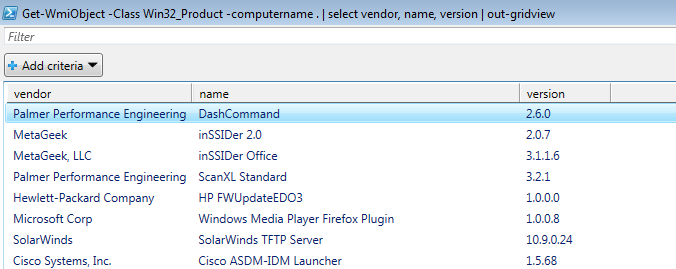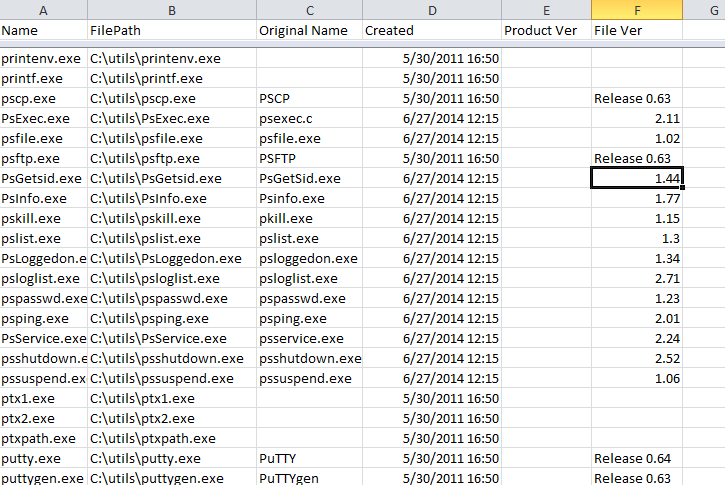The Powershell Diaries 2 - Software Inventory
After last week's story, hopefully you've got your "problem" users accounts identified. With that worked out, let's see about finding problem applications.
We all need a handle on what applications are installed on workstations for a number of reasons
- to make sure that when upgrade time comes, that nobody gets left behind
- that older apps that have security vulnerabilities or have limited function get taken care of - old versions of putty or Java for instance
- that users don't install applications that the organization hasn't paid for
- and finally, it's a decent shot at finding installed malware that your AV product might have missed.
First, let's look at the powershell command to list installed software. This is a rough equivalent of control panel / programs, or "wmic product list"
Get-WmiObject -Class Win32_Product -computername
If you run this, you'll see that this is *really* verbose (I won't show the output), and the list view is not so useful. Let's trim it down to Vendor, Product Name and Version:
Get-WmiObject -Class Win32_Product -computername . | select vendor, name, version | format-table
or, to make the display more useful, replace "format-table" with "out-gridview" or "output-csv" as we discussed last week:

But that just gives us programs that use the Microsoft installer process to install (msi's and similar packages). How about single exe type apps, things like putty.exe, sed.exe and so on? We can address those file by file:
get-childitem sed.exe | fl
Name : sed.exe
Length : 186880
CreationTime : 9/4/2012 1:33:52 PM
LastWriteTime : 3/31/2009 3:32:34 PM
LastAccessTime : 9/4/2012 1:33:52 PM
VersionInfo : File: C:\sed.exe
InternalName: sed
OriginalFilename: sed
FileVersion: 10.0.7063.0
FileDescription: SUA Utility
Product: Microsoftr Windowsr Oper
ProductVersion: 10.0.7063.0
Debug: False
Patched: False
PreRelease: False
PrivateBuild: True
SpecialBuild: False
Language: English (United States)
But we want a table view, and again just a few of those fields. The name, the original name (to account for users renaming EXE files), the file and application versions, and maybe the publisher. Some of these are a bit tricky to get, as they're lower down in the heirarchy of the object, but it's very do-able:
get-childitem ssh.exe | format-list name,creationtime,lastwritetime,@{label="ProductVersion";expression={$_.versioninfo.productversion}},@{label="FileVersion";expression={$_.versioninfo.fileversion}},@{label="Original FileName";expression={$_.versioninfo.originalfilename}}
Name : ssh.exe
CreationTime : 5/30/2011 4:50:57 PM
LastWriteTime : 8/6/2013 6:12:44 PM
ProductVersion : Release 0.63
FileVersion : Release 0.63
Original FileName : PuTTY
OOOPS - looks like I'm a rev back on putty! - note that I renamed putty to ssh, but the file metadata remembers the original name for me
This also works for more legitimate apps (excel is shown here):
get-childitem excel.exe | format-list
Directory: C:\Program Files (x86)\Microsoft Office\Office14
Name : excel.exe
Length : 20400288
CreationTime : 5/22/2015 7:11:54 PM
LastWriteTime : 5/22/2015 7:11:54 PM
LastAccessTime : 6/11/2015 3:58:19 PM
VersionInfo : File: C:\Program Files (x86)\Microsoft
Office\Office14\excel.exe
InternalName: Excel
OriginalFilename: Excel.exe
FileVersion: 14.0.7151.5001
FileDescription: Microsoft Excel
Product: Microsoft Office 2010
ProductVersion: 14.0.7151.5001
Debug: False
Patched: False
PreRelease: False
PrivateBuild: False
SpecialBuild: False
Language: Language Neutral
Great, you say, how is inventorying things one file at a time useful? Let's use get-childitem recursively and pull all the EXE's in one shot. This is a reasonable way to grab everything. With that in a spreadsheet or database, you'll likely want to delete duplicates entries (multiples for MS Office for instance), then after a closer look, store that as a baseline to track for changes at a later date.
get-childitem c:\*.exe -recurse | format-table name,creationtime,lastwritetime,@{label="ProductVersion";expression={$_.versioninfo.productversion}},@{label="FileVersion";expression={$_.versioninfo.fileversion}},@{label="Original FileName";expression={$_.versioninfo.originalfilename}},@{label="Product";expression={$_.versioninfo.product}}
Or, better yet, using a slightly different script and outputting to CSV - so you can more easily read it in excel or dump it to a database:
Get-ChildItem -Path c:\utils\*.exe -Recurse |`
foreach{
$Item = $_
$Filename = $_.Name
$Ver = $_.versioninfo.productversion
$filever = $_.versioninfo.fileversion
$Age = $_.CreationTime
$originalname = $_.versioninfo.originalfilename
$product=$_.versioninfo.product
$Path | Select-Object `
@{n="Name";e={$Filename}},`
@{n="FilePath";e={$Item}},`
@{n="Original Name";e={$originalname}},`
@{n="Created";e={$Age}},`
@{n="Product Ver";e={$product}},`
@{n="File Ver";e={$filever}}`
}| Export-Csv d:\sans\Results.csv -NoTypeInformation

Note that not all values are populated in the metadata for every file - that's just the way it is when you're processing standalone files like this.
Using this approach, you can see that with maybe an afternoon of scripting effort, you can set up a system that you might otherwise pay thousands or tens of thousands of dollars for - assuming that you're OK running your software inventory system from the CLI. For me, running my inventory from the CLI would be prefered, but I guess you figured that out !
Have you found a trick to process information like this more efficiently? Got a better script to collect this info more simply? Please, share using our comment form!
===============
Rob VandenBrink
Metafore



Comments
Anonymous
Jun 29th 2015
1 decade ago
http://blogs.technet.com/b/heyscriptingguy/archive/2011/11/13/use-powershell-to-quickly-find-installed-software.aspx
about running WMI queries against win32_product.
Also, when building expressions using the old style:
@{label="FileVersion";expression={$_.versioninfo.fileversion}}
is deprecated and may not work on newer version of of Powershell. Use the newer style (as you do later in the post):
@{n="FileVersion";e={$_.versioninfo.fileversion}}
n being short for name and e being short for expression.
Anonymous
Jun 29th 2015
1 decade ago
Anonymous
Jun 30th 2015
1 decade ago
Anonymous
Jul 2nd 2015
9 years ago
I also have a subscription to powershell.com, where they produce a regular email newsletter with equally excellent tips almost daily.
Keep up the good work!
Robert
Anonymous
Jul 2nd 2015
9 years ago